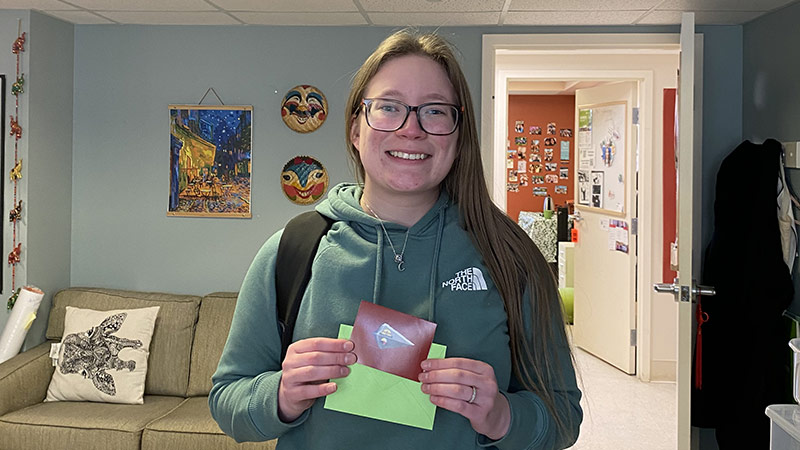Games for change raise student awareness of Indigenous culture
Author: Alex Graham
Posted on Jun 11, 2024
Category: UNB Fredericton

When University of New Brunswick (UNB) student Arnab Taranga saw a group of his friends gathered at a campus hangout in intense conversation, he knew he’d put the pieces together for an impactful awareness campaign.
“I’m very bad at puzzles,” Taranga laughed. However, as the co-founder of Heart to Heart, which is a partnership program between the UNB Fredericton International Student Advisor’s Office and the Mi’kmaq-Wolastoqey Centre, Taranga found himself immersed in the brain teasers across campus throughout the month of March.
Part of an event called The Heart to Heart Puzzle Pursuit, the weekly challenges were meant to engage students with the Indigenous cultures that surround them on campus and beyond.
“My favourite puzzle was the one from week two which was a play on letters in a paragraph,” Taranga said. The six-letter answer, ORANGE, had to be derived from select letters in a series of Indigenous-centred scrambled words.
“That one was very interesting for me because it was about the Wolastoq River, and I’m very passionate about restoring the name of the river,” Taranga said of the clue which asked for the Indigenous name of what is also known as the Saint John River.
“And I personally liked it the most because I remember meeting some friends at the SUB (Student Union Building), and I saw them all gathered around at a table and thought they were probably studying.”
“Turns out, lo and behold, they were doing the puzzle and they’re like, ‘Can you help us out?’” he laughed.
Taranga told his friends he couldn’t help them solve the riddle, but he was happy they were engrossed in the challenge that was helping them learn about Indigenous cultures in New Brunswick.
“It’s usually called ‘serious games’ or ‘games for change’” explained Dr. Scott Preston, head of UNB’s applied game design research group, Resolve, which worked with Heart to Heart to create the challenges.
“The idea is to study and create games that are for educational purposes, rather than just entertainment. Trying to use game design for education, training or social change.”
Resolve gained experience working with live, student-focused games in the summer designing an “Amazing Race” style scavenger hunt for orientation in September.
That game was a success, but they knew with frigid winter temperatures the approach would have to be different for a game in March.
“We couldn’t really have students going outside and I knew Heart to Heart had concerns about accessibility, especially with some students not being able to come to campus,” explained Pippa Painter, a student intern at Resolve who helped design the games in the Puzzle Pursuit.
“So, we decided to make this mostly based on online puzzles, where students could interact online… but we had the option to dig deeper into the puzzles we were creating, and to do a scavenger hunt.”
Two puzzles were released on social media every week, for three weeks, with rewards for solving each one. Then there was the grand prize up for grabs to those who really got into the theme behind all the puzzles.
“We put one big treasure physically on campus,” said Preston. “Players could figure out how all the clues connected and find the big prize we had stashed away.”
Heart to Heart engaged players in the various games, awarding winners with prizes like a cherry blossom Lego set, a pocket printer for a smartphone and a Walmart gift card. The event culminated with a grand prize of an iPad hidden on the Fredericton campus, for the final puzzle that encompassed all the rest.
Over the course of the campaign, Heart to Heart increased its Instagram followers by 18 per cent and clocked in over 13,000 views of the puzzles over that medium. Over the three weeks the Puzzle Pursuit ran, the six puzzles brought in over 450 responses from students.
“We wanted to reach as many people as we could,” Taranga said. “When we created Heart to Heart, I realized the understanding of Indigenous knowledge and Indigenous cultures was not common among students, just because it’s not something that’s talked about. UNB is working towards Truth and Reconciliation but it’s not as broad as we would like it to be.”
“It’s 2024 and we should do more for Truth and Reconciliation. Part of that is understanding Indigenous cultures, histories, ways of life and the injustices that are still taking place today. It’s also immensely important for our students, who are future leaders, to raise their awareness for themselves and for Indigenous students on campus.”
Taranga says it wasn’t easy for Resolve and Heart to Heart to create a successful game that would keep students engaged for three weeks, but that the hard work was worth it.
“I believe this is going to motivate other groups on campus to do collaborative events because at the end of the day, we may have small organizations but when we unite together it turns into something magnificent.”
Learn more about Resolve and follow them on Instagram.
Heart to Heart can be found on Instagram and by email at hearttoheart@unb.ca.
